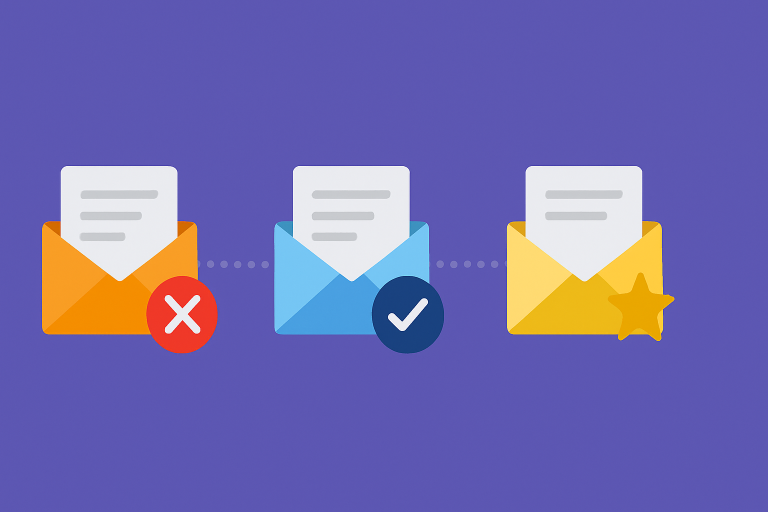One of the most frustrating experiences for businesses is when important emails land in the spam folder instead of the recipient’s inbox. Whether you are sending invoices, proposals, or updates, undelivered emails can hurt your reputation and business relationships.
At Erichost, we often get this question: *“Why do my emails go to spam even when I am not spamming?”*
Let’s break it down.
Why Your Emails May End Up in Spam
1. Previous Spam Activities on the Server
If your domain or IP address was previously used for sending bulk or unsolicited emails, it may already be blacklisted by major email providers like Google, Yahoo, or Outlook. Even if you personally did not send spam, the reputation of the server matters.
2. Shared Environment Hosting Risks
Most small businesses start with shared environment hosting. While cost-effective, it comes with a hidden drawback: shared IP addresses.
* In shared environment hosting, multiple customers use the same server and IP address for sending emails.
* If one of those customers engages in malicious activities like spamming, phishing, or promoting illegal products, the entire IP reputation suffers.
* As a result, your clean and legitimate emails can also get flagged as spam — simply because you share the same IP as the spammer.
This is one of the main reasons why Google often pushes webmail emails (from cPanel, Plesk, etc.) into spam.
—
How to Prevent Emails from Going to Spam
While there is no permanent guarantee of inbox delivery (since every provider has its own rules), you can significantly improve your chances by following these best practices:
1. Use Premium Mailing Services
* Services like Google Workspace (formerly G Suite) and Zoho Mail are designed for businesses.
* They provide high-reputation mail servers, strict spam policies, and better inbox placement.
2. Use a Dedicated IP for Emails
* If you prefer hosting your own emails, using a dedicated IP ensures that only your domain reputation affects your deliverability.
* You are no longer at the mercy of other users on the server.
3. Maintain Good Email Practices
* Authenticate your emails with SPF, DKIM, and DMARC.
* Avoid spammy subject lines or attachments.
* Send to verified contacts, not purchased lists.
* Keep your IP and domain clean by monitoring blacklists.
Shared IP vs Dedicated IP vs Premium Email Services
When it comes to email hosting and deliverability, choosing the right setup makes a big difference. Here’s a breakdown:
Shared IP (Default in Shared Environment Hosting)
- What it is: Your emails are sent through an IP address shared with multiple other users/websites.
- Pros:
- Cheapest option (included in shared environment hosting).
- No extra setup required.
- Cons:
- Your reputation depends on others on the same server.
- If one user spams, the whole IP gets blacklisted.
- High chance of your emails landing in spam or junk.
Best for: Beginners, hobby websites, or very low email usage.
Why it’s not ideal: You have zero control over IP reputation. Even if you follow all rules, others can ruin your deliverability.
Dedicated IP
- What it is: A unique IP address assigned only to you for sending emails.
- Pros:
- Reputation is fully under your control.
- Better inbox placement compared to shared IP.
- Essential for businesses sending bulk but legitimate emails (like newsletters, invoices, customer updates).
- Cons:
- Additional cost compared to shared IP.
- Requires proper configuration (SPF, DKIM, DMARC) and consistent sending to maintain a healthy reputation.
Best for: Small-to-medium businesses that want control over their email deliverability without moving to premium services.
Premium Email Services (Google Workspace, Zoho Mail, Microsoft 365)
- What it is: Business-grade email platforms hosted by trusted providers with global infrastructure.
- Pros:
- Industry-leading deliverability (Google/Microsoft servers are trusted everywhere).
- Built-in anti-spam and security.
- Comes with professional features (storage, calendars, collaboration tools).
- No worries about server management or IP reputation.
- Cons:
- Monthly subscription cost per user.
- May be expensive for teams with many accounts.
Best for: Businesses that rely heavily on email communication and want near-guaranteed inbox placement with zero hassle.
Why it’s the best overall: You get professional-grade infrastructure, security, and deliverability — without worrying about server reputation or setup.
Which One Should You Choose?
- If budget is the only concern: Shared IP (but be ready for spam issues).
- If you want control and reliability without high recurring costs: Dedicated IP.
- If you want the best deliverability, security, and features: Premium Email Services (Google Workspace, Zoho Mail, Microsoft 365).
Final Verdict:
- Shared IP = Avoid for business use.
- Dedicated IP = Good balance for growing businesses.
- Premium Email = Best choice for professional communication.

